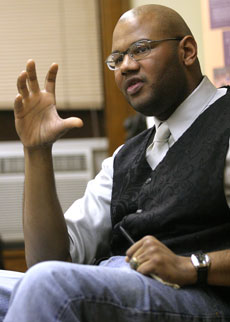Discussion analyzes women in hip-hop

Josh Birnbaum
March 1, 2006
“Sex, Women and Hip-hop,” a discussion forum dealing with the objectification of black women, was held Tuesday at the African American Cultural Center.
About 25 people were present, and a video on the topic was shown followed by a discussion led by two University graduate students.
Marcus Reynolds, senior in Business and coordinator for the event, said the night was dedicated to informing the public on the effects of black women’s portrayal as sexual objects in music videos, lyrics and any other medium of hip-hop.
“The way black women are portrayed in the hip-hop community is profane in the way their bodies are used as commodities,” said Aisha Durham, graduate student and co-discussion leader for the event.
Durham, a self-proclaimed hip-hop feminist, also said the portrayal of women in hip-hop has had negative effects for black women in other areas such as politics. She said the problem is the greater ideology behind what is present in the music videos and other media.
Get The Daily Illini in your inbox!
“It’s not just about focusing on the music video itself, but connecting the image to larger systems of exploitation,” Durham said.
She said the night was about understanding “how women’s bodies are implicated in larger systems of exploitation.”
Melvin Armstrong, Jr., graduate student and the other discussion leader with Durham, said the line between commodities and human beings could become blurred in a capitalist society such as the U.S.
Armstrong likened the night to an ember burning in a forest and turning into a fire that would motivate people to recognize the objectification of women that is present in the hip-hop community.
“We would like to see this be a jump-off point,” Armstrong said. “My primary concern is a qualitatively better society.”






